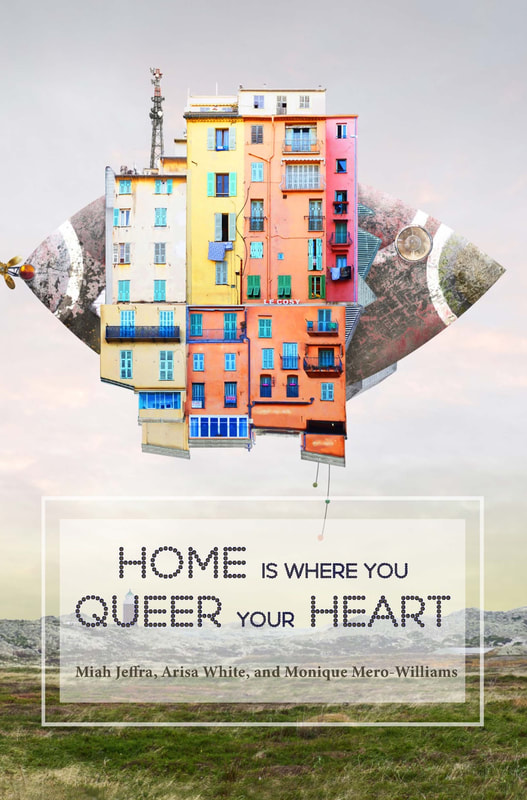|
The Breadcrumbs widget will appear here on the published site.
By Alex Carrigan
2020 definitely changed how we all view our homes. Suddenly, our homes became our offices, our hangouts, our wedding venues, and more. We were all made to rethink how we view these spaces and what the concept of “home” could mean to us.
In a new anthology from Foglifter Press, Home is Where You Queer Your Heart gathers work from 69 queer authors to examine the concept of “home.” Since this is one concept that is commonly explored in LGBT+ literature, the anthology had the task to find a new way to address, deconstruct, and reconstruct the theme. For that, the editors of Home adapted the four cardinal directions from “The Third Dimension: Linear Space and Time” found in Alchemy of Nine Directions by Barbara Hand Clow. In this work, the four cardinal directions each have their own meaning, thus the editors sought to organize the pieces in the collection by figuring out which of the four most suited the work. In the first section, East, which claims “where the sun meets your face, are writings that come to offer you creative guidance.” These include prose pieces like Claudia Rodriguez’s “Amalia’s Kitchen” which recounts the memories associated with the kitchen their narrator grew up in. Alexis Pauline Gumbs examines this in the history of a dolphin in captivity in “Eye of Heaven,” while Jason Villemez’s “All These Cats Have AIDS” is a recount of a queer couple who was torn apart due to prejudice during the AIDS crisis. Even the poems, such as Jubi Arriola-Headley’s “& You Shall Know Me by My Lists” and “All the Dead Boys Look like Me” by Christopher Soto look at creative guidance through the former making like and dislike lists in an unfamiliar location and the latter reexamining their self following the Orlando massacre. After that, in the North section, which states “on the left, where your heart is housed, these works inspire you to seek the most challenging outcome of the day,” the pieces involve more direct conflicts. These range from “The Reincarnation of Wonder Woman,” where Baruch Porras Hernandez writes about a boy in Mexico who emulates Wonder Woman to deal with bullying, to KJ Cerankowski’s “Home is Where my Cock is” where the narrator focuses on a lost dildo in the midst of her breakup with her girlfriend. The poems in this section are also a bit more experimental, such as in “In the Wake of a Transfer,” where Michal MJ Jones writes about the death of Nia Wilson in a three part poem that addresses her murder. Dorothy Chan follows this with “Triple Sonnet, Because You Are Not My Home, You Are Not Home, You Are Not My Family,” where the daughter of Chinese immigrants deals with prejudice from her family over her bisexuality. “On your right, the organ you cannot say without ‘live,’ stories of those who want to support and nurture you” is the line that defines the South section, and the pieces are all about comfort and nurturing. Stacy Nathaniel Johnson’s “Kitchen” discusses black woman hair care in the American military. Marlin M. Jenkins’s “an apostrophe denotes ownership” looks at the comfort that can come from romantic relationships, with lines like “i loved a woman / who called me hers / and so to her / i belonged / her name plus an apostrophe / to denote possession.” Prose pieces like “Dirty Things” by K-Ming Chang shows the comfort from a romantic moment of riding a car wash together, while Shelagh Patterson’s “Untitled” covers the life of its narrator with focus on their efforts to foster with their wife. Closing out the collection is the West section, which states “at your back, the love and homes that have sheltered you are here, loved and housed by the love and homes that have sheltered them, writings that show you what you need to transform and let go.” These pieces carry the feeling of resolution, some definite and some ambiguous. Donika Kelly's "Every moment I have been alive, I have been at the height of my powers" carries the cardinal directions motif of the anthology to lead into a poem discussing family and the separation from family history. "Vermont Getaway: Thirteen Gays Looking at a Blackbird" by Michael Montlack may read like an odd discussion between thirteen people, but also shows a moment of these individuals being content to be themselves and engage in inane conversations. The prose pieces follow a similar range. In "The Explosions are Magnificent" by Mel Nigro, a "bad girl" returns to a small town in the south in the 1970s and her relationship with the main character can open them to a world beyond their small town way of thinking. Soma Mei Sheng Frazier's "Face" follows a group of people helping a woman leave her abusive partner, with the story following their different mindsets in response to this. Overall, Home is Where You Queer Your Heart is an extensive collection of queer authors examining the concept of "home" in very unique ways. The framing device helps to make the collection easier to digest in chunks for those who may be intimidated by its size. It helps to space the collection out in your reading to absorb the tone of each section and to find the connections between the pieces. But however you read it, the collection is a great look into where queer literature will go in the 2020s and how these traditional concepts may be examined going forward.
0 Comments
CommentsYour comment will be posted after it is approved.
Leave a Reply. |
AuthorWrite something about yourself. No need to be fancy, just an overview. Archives
March 2024
Categories
All
|




 RSS Feed
RSS Feed






